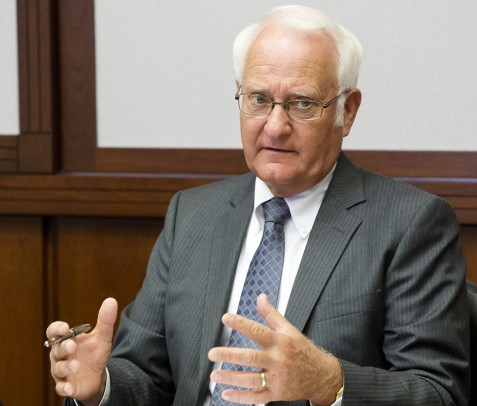Income tax changes could cut UI state funding

University leaders will lobby for more state funding, UI President Bob Easter says. Photo: L. Brian Stauffer
The university’s state funding could be cut 12.5 percent if a temporary state income tax, passed in 2011, expires next January.
That’s the prediction from the Illinois Board of Higher Education, University President Bob Easter told the UI Board of Trustees at its March 6 meeting on the Urbana-Champaign campus.
University leaders will spend this spring lobbying legislators for level university funding, Easter said.
“We have to be prepared for that potential outcome,” he said, “and we’ll continue to argue strongly for stable funds.”
The university’s state appropriation now stands at nearly $650 million. If the tax expires and corresponding cuts are made, the university could lose $80 million in annual tax-supported state funding.
Easter said university officials will testify this month at a House appropriations committee meeting a few days before Gov. Pat Quinn’s annual budget address.
“We will point to projects like the Digital Manufacturing and Design Innovation Institute” as examples of the university’s economic and workforce impact and proof that the three campuses are a good return on state investment, he said.
The digital manufacturing institute, based at Chicago’s UI LABS and announced by the White House Feb. 25, is a partnership with business, civic, government and higher education.
“They’ll probably ask more questions than usual,” said Walter Knorr, the chief financial officer, of the upcoming legislative budget meeting. “I think we can expect a more aggressive hearing.”
Easter said the timing of the tax expiration is problematic because it is scheduled for the middle of the fiscal year, which makes long-range planning difficult.
He said losing a large percentage of state funds would make it even more difficult to attract and retain top faculty members — already challenging because of recent changes in the state-supported pension system and other funding and employee equity issues.
Knorr said the bottom line could be further affected by a new law requiring the university to report unfunded state pension obligations on its own financial balance sheet. Doing so would “wipe out” any positive aggregate cash balances, he said.
How this will affect the university’s borrowing rates, which is currently four levels above the state’s rating, is unknown.
“Moody’s is wrestling with how they’re going to view that,” Knorr said.
U of I Foundation President Thomas Farrell reported that an effort to double philanthropic giving within the next decade is going according to plan, but the program will not bear fruit in the near term.
He said fundraising this year is down by more than 16 percent from the five-year average, but that will change as the long-term plan is implemented. The plan includes a 22 percent increase in the foundation’s base budget and the addition of 67 new fundraisers and support employees.
A public fundraising program will be announced for 2017 to run in conjunction with the university’s 150th anniversary. The foundation’s goal is an annual 7.9 percent increase in revenue.
“There’s going to be a lag because we’re in a transition,” he said. “But we’re setting some pretty ambitious goals and we’re not giving up. We are remaining optimistic.”
